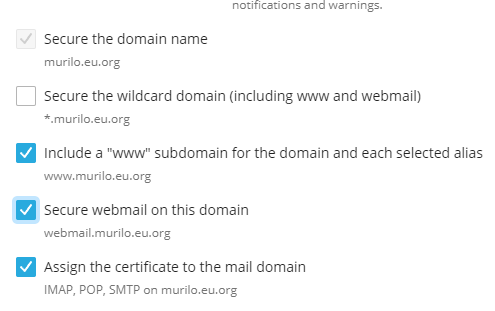
murilo
-
Posts
28 -
Joined
-
Last visited
Posts posted by murilo
-
-
On 8/21/2022 at 12:48 AM, Krydos said:
Oh, I didn't see I could reissue certificates by myself. Thanks, Krydos. Anyways, why it doesn't renew the certificates having these options enabled by default?
-
Hey,
When I had my main domain switched to murilo.eu.org, Plesk generated a certificate for murilo.eu.org, which had www.murilo.eu.org and webmail.murilo.eu.org in scope, and other certificates for each subdomain I have.
Recently, my certificates were renewed and that one no longer has webmail.murilo.eu.org in scope, and no different certificate was issued for it.
Although the control panel has a message saying "Webmail not secured", I'm not seeing any options to generate a certificate like how the old one was, a wildcard certificate for my domain or a certificate only for webmail.
Please help!
-
Thank you so much!
-
I want to have my main domain changed.
Also, could you create a subdomain called "nnidlt" pointing to the the folder /public_html/nnidlt/?
Thanks once again!

-
2 minutes ago, Unknown025 said:
I'll escalate your post so an admin can help you.
Alright. Thanks!
-
My eu.org domain (murilo.eu.org) was recently approved and I would like to switch from my heliohost.us domain (murilo.heliohost.us) to it.
I already did set it to point to HelioHost's nameservers.
Thanks!
-
Oh, hey! Another brazilian using HelioHost's services!
-
 1
1
-
-
9 minutes ago, Krydos said:
First of all the working link has "nnidlt" and the invalid link has "niidlt" so that's why it's giving a 404 error.
Oh, sorry, my bad. I typed the link manually.
9 minutes ago, Krydos said:I commented that out and now it gives the expected JSON response. https://murilo.heliohost.us/nnidlt/api.php?env=production&user_id= It seems like Plesk is trying to give some custom error page for 400 errors for some reason. Not sure why. Does that script need to return a 400 error or is 200 response with the correct json error enough?
Hmm... weird. Yes, it's meant to give 400 since the JavaScript that pulls from that API looks for a response code different from 200 to display the error mesage. I can try using another response code I guess.
-
I used to host that script in InfinityFree before I was moved to Plesk, and in there it works perfectly.
-
Not really long.
See yourself:
https://murilo.heliohost.us/nnidlt/api.php?env=production&user_id=Krydos (Valid request.)
https://murilo.heliohost.us/nnidlt/api.php?env=production&user_id= (Invalid request. The GET parameter user_id is required. The server should respond with 400 HTTP response code and a json-encoded message, but it doesn't for some reason and a weird Apache error occurs.)
I don't know what to do.
-
Makes sense. I'm gonna do that then.
-
My PHP script is programmed to return a json-ecoded error when certain $_GET parameters are empty, but instead it is returning Apache's default 403 Forbidden screen + Plesk's 500 Internal Server Error screen
Right after, the following stuff appear in the server logs:
ModSecurity: Access denied with code 403 (phase 3). Match of "validateByteRange 0-31" against "ARGS:env" required. [file "/etc/httpd/conf/modsecurity.d/rules/comodo_free/30_Apps_OtherApps.conf"] [line "6649"] [id "243420"] [rev "4"] [msg "COMODO WAF: Information disclosure vulnerability in Eclipse Jetty before 9.2.9.v20150224 (CVE-2015-2080)||murilo.heliohost.us|F|2"] [severity "CRITICAL"] [tag "CWAF"] [tag "OtherApps"] [hostname "murilo.heliohost.us"] [uri "/nnidlt/api.php"] [unique_id "YqzLmsxfvqHEorQQS6SJXgAAARI"]
(20014)Internal error: mod_fcgid: ap_pass_brigade failed in handle_request_ipc function
Please help!
-
I was also affected by Options -Indexes not working.
In Plesk's website, they say directory listing is disabled by default, but in HelioHost it is enabled by default. Couldn't it be disabled, please?https://support.plesk.com/hc/en-us/articles/360002534354-How-to-enable-disable-directory-browsing-for-a-domain-in-Plesk-for-Linux
-
Alright. Thanks. :)
-
Oh, I figured out why the donation is linked to that account. A friend of mine made the donation using their PayPal account in my behalf. They ended up creating an HelioHost account for them with the same email address from the PayPal account, and ended up having the donation linked to it, but it is meant to be linked to me.
-
No, I didn't. Weird.
-
Hey, I made a donation last year in order to have my account moved to Tommy, and it isn't counting to the donation value that influences my position at the Plesk transfer queue.
Here's the thread I created back then:
If it shouldn't count, please let me know.
Thanks!
-
It's a pleasure to contribute to a great service like HelioHost!

-
Hello, I made a donation and I would like to be moved from Johnny to Tommy.
Transaction ID: 0PK931715C392773G
Username: murilo
Thanks!
-
Well, I'm going to keep the unlink thing in the code since it doesn't return any errors or problems. I don't know if it's necessary to have references to the shared /tmp folder for Imagick to save files on it. Hope it's now cleaning itself.
-
My software is a social network. That code uploads an user image to Cloudinary for being attached to their post. I tried running the script without the unlink line and it didn't create any files in my /tmp folder. Something is wrong. The code doesn't make any references to any other places that it could save temporary files. I'm confused now.
-
Oh, thanks for letting me know about that. I moved the unlink to a line before return and the script still works. Maybe it's cleaning itself now?
-
I implemented that line in my script and apparently it worked. It looks like this now:
function uploadImage($file, $width = null, $height = null) { if($width !== null && $height !== null && extension_loaded('imagick')) { $imagick = new Imagick(); $imagick->setRegistry('temporary-path', '/home/murilo/tmp'); $imagick->readImageBlob($file); if($imagick->getImageFormat() === 'GIF') { $imagick = $imagick->coalesceImages(); $imagick->cropThumbnailImage($width, $height); while($imagick->nextImage()) { $imagick->cropThumbnailImage($width, $height); } $imagick = $imagick->deconstructImages(); } else { $imagick->cropThumbnailImage($width, $height); } $file = $imagick->getImagesBlob(); } if(empty(CLOUDINARY_CLOUDNAME) || empty(CLOUDINARY_UPLOADPRESET)) { return null; } $mime = finfo_buffer(finfo_open(), $file, FILEINFO_MIME_TYPE); $ch = curl_init('https://api.cloudinary.com/v1_1/' . urlencode(CLOUDINARY_CLOUDNAME) . '/image/upload'); curl_setopt($ch, CURLOPT_RETURNTRANSFER, true); curl_setopt($ch, CURLOPT_POST, true); curl_setopt($ch, CURLOPT_POSTFIELDS, http_build_query(['upload_preset' => CLOUDINARY_UPLOADPRESET, 'file' => 'data:' . $mime . ';base64,' . base64_encode($file)])); $response = curl_exec($ch); $responseJSON = json_decode($response); $responseCode = curl_getinfo($ch, CURLINFO_RESPONSE_CODE); if($responseCode > 299 || $responseCode < 200) { return null; } curl_close($ch); return $responseJSON->secure_url; unlink ($file, file, $imagick, 'temporary-path'); } -
function uploadImage($file, $width = null, $height = null) { if($width !== null && $height !== null && extension_loaded('imagick')) { $imagick = new Imagick(); $imagick->readImageBlob($file); if($imagick->getImageFormat() === 'GIF') { $imagick = $imagick->coalesceImages(); $imagick->cropThumbnailImage($width, $height); while($imagick->nextImage()) { $imagick->cropThumbnailImage($width, $height); } $imagick = $imagick->deconstructImages(); } else { $imagick->cropThumbnailImage($width, $height); } $file = $imagick->getImagesBlob(); } if(empty(CLOUDINARY_CLOUDNAME) || empty(CLOUDINARY_UPLOADPRESET)) { return null; } $mime = finfo_buffer(finfo_open(), $file, FILEINFO_MIME_TYPE); $ch = curl_init('https://api.cloudinary.com/v1_1/' . urlencode(CLOUDINARY_CLOUDNAME) . '/image/upload'); curl_setopt($ch, CURLOPT_RETURNTRANSFER, true); curl_setopt($ch, CURLOPT_POST, true); curl_setopt($ch, CURLOPT_POSTFIELDS, http_build_query(['upload_preset' => CLOUDINARY_UPLOADPRESET, 'file' => 'data:' . $mime . ';base64,' . base64_encode($file)])); $response = curl_exec($ch); $responseJSON = json_decode($response); $responseCode = curl_getinfo($ch, CURLINFO_RESPONSE_CODE); if($responseCode > 299 || $responseCode < 200) { return null; } curl_close($ch); return $responseJSON->secure_url; unlink ($file);This is the code. I just added "unlink ($file);" in the end of it. Didn't give me an Internal Server Error, so I guess it's working.


[Solved] Plesk didn't issue certificate for webmail subdomain
in Customer Service
Posted
Yeah.